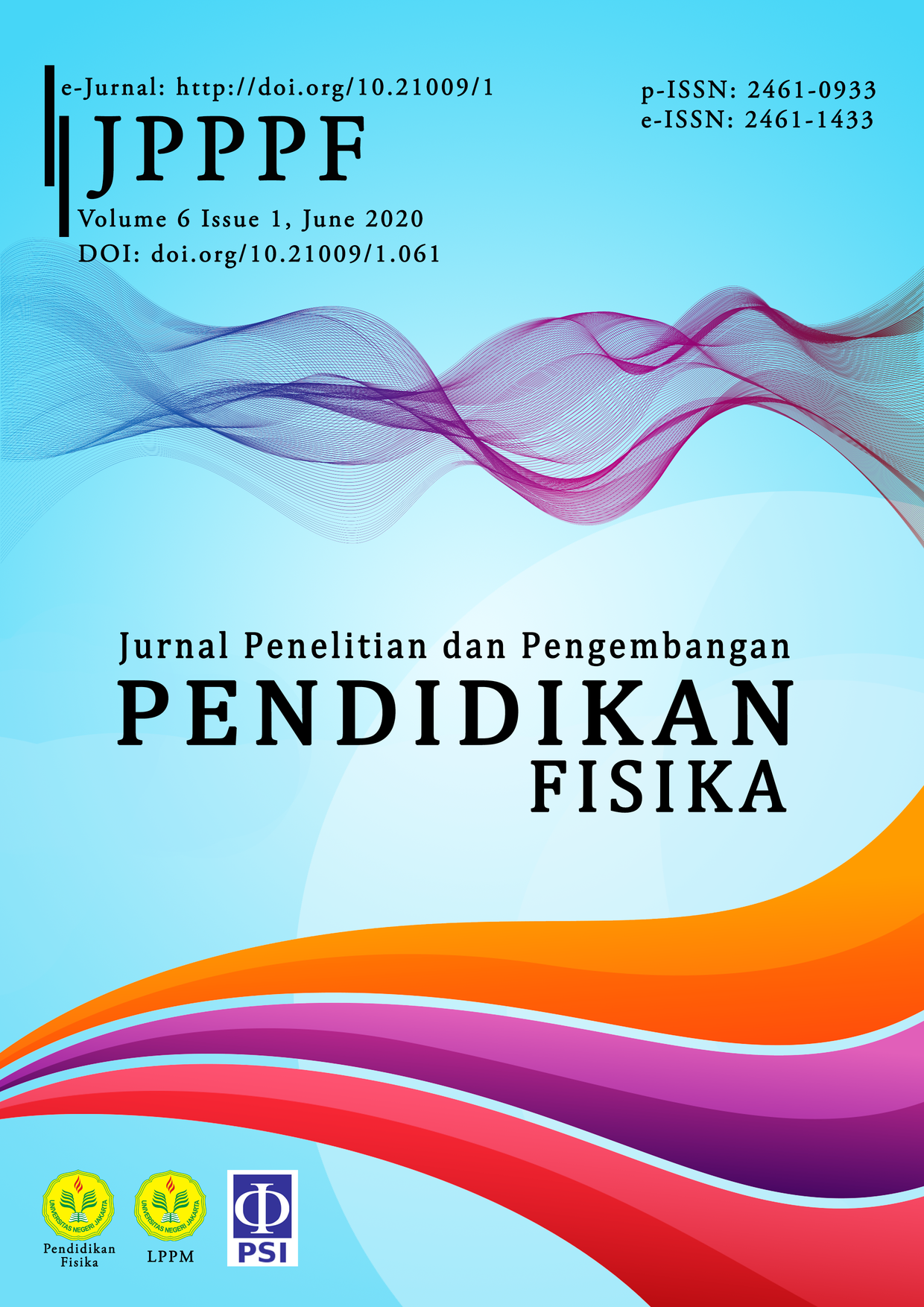Improvement of Science Process Skills Through Sound Variable Intensity Level Tool Kit
DOI:
https://doi.org/10.21009/1.06110Keywords:
development experiment tool kit, science process skill, the sound intensity levelAbstract
Science process skills (SPS) are essential to assist the learning of senior high school students according to the 2013 curriculum, which prioritizes a scientific approach. The learning method that supports SPS is experiment methods. Nevertheless, learning with experimental methods is still rarely applied in schools, especially in the sound intensity level concept. The reason is the limited number and variant of experiment tool kits to support learning in schools. This study aims to develop a sound variable intensity level sound tool kit based on development procedures proposed by Jan van de Akker (2006). Sound variable intensity level kit was developed based on tool kit, which was developed before by Fikri Habibi. Sound variable intensity level experiment kit was evaluated by several learning media and learning material experts before being tested on high school students in several stages, including the one-on-one evaluation stages, small group evaluations, and field tests. The researcher revised the sound variable intensity level kit based on suggestions from the experts and the students. After being revised, the sound variable intensity level kit was tested on summative evaluation. Based on the results of summative evaluations, the sound variable intensity level kit becomes a successful, practical, and effective learning support tool kit for improving the science process skills of the student in the concept of sound intensity level.
References
Alfiyah, S, Bakri, F, & Raihanati, R 2016, ‘Pengembangan Set Praktikum Fluida Dinamis untuk Sekolah Menengah Atas (SMA) Kelas XI’, JPPPF - Jurnal Penelitian & Pengembangan Pendidikan Fisika, vol. 2, no. 2.
Bumbacher, E, Salehi, S, Wieman, C, & Blikstein, P 2017, ‘Tools for Science Inquiry Learning: Tool Affordances, Experimentation Strategies, and Conceptual Understanding’, Journal of Science Education and Technology, vol. 27, pp. 215-35.
Chiam, CL, Hong, H, Kwan, FNH, & Tay, WY 2014, Creative and Critical Thinking in Singapore Schools, National Institute of Education, Singapore.
Dagdeviren, OE 2018, ‘Experiments to investigate acoustic properties of sound propagation’, Physics Education, vol. 53, no. 4, pp. 1-5.
Edie, S, Masturi, SHN, & Alighiri D 2018, ‘The effect of using bomb calorimeter in improving science process skills of physics students’, Journal of Physics: Conference Series’, vol. 983, no. 1.
Habibi, F & Prabowo 2015, ‘Pengembangan Alat Peraga Pengukuran Taraf Intensitas Bunyi Berbasis Visual Analyser Sebagai Media Pembelajaran Fisika Pokok Bahasan Bunyi’, Jurnal Inovasi Pendidikan Fisika, vol. 4, no. 2, pp. 169-75.
Halliday, D & Resnick, WJ 2013, Fundamentals of Physics 10th Edition, Wiley, New York.
Hirca, N 2013, ‘The Influence of Hand on Physics Experiments on Scientific Process Skills According to Prospective Teachers’ Experiences’, European Journal of Physics Education, vol. 4, no. 1, pp. 6-14.
Rustaman 2005, Strategi Belajar Mengajar Biologi, UM Press, Malang.
Sagala, SH 2014, Konsep dan Makna Pembelajaran: Untuk membantu memecahkan problematika belajar mengajar, Penerbit Alfabeta, Bandung.
Solihan, S, Astra, IM, & Budi, E 2018, ‘The Development of Thermal Expansion Practicum Sets to Improve Science Process Skills of High-School Students’, JPPPF - Jurnal Penelitian & Pengembangan Pendidikan Fisika, vol. 4, no. 2.
Somyurek, S 2014, ‘An effective educational tool: construction kits for fun and meaningful learning’, International Journal of Technology and Design Education, vol. 25, pp. 25-41.
Sugiyono 2018 Metode Penelitian Pendidikan (Pendekatan Kuantitatif, Kualitatif, dan R &D, Penerbit Alfabeta, Bandung.
Sunaryo, S, Bakri, F, Abriansyah, MC, & Muliyati, D 2018, ‘Mini photovoltaic system project: Physics laboratory activities through a technology-rich learning environment’, IOP Conf. Series: Journal of Physics: Conf. Series, vol. 1318.
Sutarto, H 2018, ‘Lingkungan dalam Pembelajaran dan Pengajaran Matematika yang Memunculkan 4C Ability sebagai Penyiapan SDM Unggul di Era Revolusi Industri 4.0’, Seminar Nasional Pendidikan Matematika UHAMKA, vol. 1, pp. 465-76.
Tessmer, M 1993, Planning and Conducting FORMATIVE Evaluation: Improving the Quality of Education and Training, Routledge, London & New York.
Zulfiani, FT 2009, Strategi Pembelajaran Sains, Lembaga Penelitian UIN Jakarta, Jakarta.











